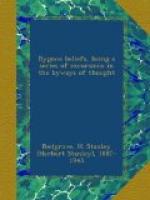Another and undeniable claim to greatness rests on ROGER BACON’S broad-mindedness. He could actually value at their true worth the moral philosophies of non-Christian writers—SENECA (c. 5 B.C.- A.D. 65) and AL GHAZZALI (1058-1111), for instance. But if he was catholic in the original meaning of that term, he was also catholic in its restricted sense. He was no heretic: the Pope for him was the Vicar of CHRIST, whom he wished to see reign over the whole world, not by force of arms, but by the assimilation of all that was worthy in that world. To his mind—and here he was certainly a child of his age, in its best sense, perhaps—all other sciences were handmaidens to theology, queen of them all. All were to be subservient to her aims: the Church he called “Catholic” was to embrace in her arms all that was worthy in the works of “profane” writers—true prophets of God, he held, in so far as writing worthily they unconsciously bore testimony to the truth of Christianity,—and all that Nature might yield by patient experiment and speculation guided by mathematics. Some minds see in this a defect in his system, which limited his aims and outlook; others see it as the unifying principle giving coherence to the whole. At any rate, the Church, as we have seen, regarded his views as dangerous, and restrained his pen for at least a considerable portion of his life.
ROGER BACON may seem egotistic in argument, but his mind was humble to learn. He was not superstitious, but he would listen to common folk who worked with their hands, to astrologers, and even magicians, denying nothing which seemed to him to have some evidence in experience: if he denied much of magical belief, it was because he found it lacking in such evidence. He often went astray in his views; he sometimes failed to apply his own method, and that method was, in any case, primitive and crude. But it was the RIGHT method, in embryo at least, and ROGER BACON, in spite of tremendous opposition, greater than that under which any man of science may now suffer, persisted in that method to the end, calling upon his contemporaries to adopt it as the only one which results in right knowledge. Across the centuries—or, rather, across the gulf that divides this world from the next—let us salute this great and noble spirit.




